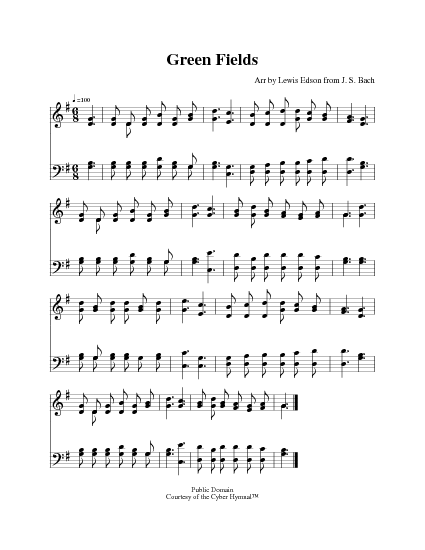- |
User Links
All-sufficiency of Jesus

How tedious and tasteless the hours
Author: John NewtonTune: CONTRAST (German)
Published in 647 hymnals
Printable scores: PDF, MusicXMLAudio files: MIDI, Recording
Representative Text
1 How tedious and tasteless the hours
When Jesus no longer I see!
Sweet prospects, sweet birds, and sweet flowers,
Have all lost their sweetness to me;
The midsummer sun shines but dim,
The fields strive in vain to look gay;
But when I am happy in Him,
December's as pleasant as May.
2 His name yields the richest perfume,
And sweeter than music His voice;
His presence disperses my gloom,
And makes all within me rejoice;
I should, were He always thus nigh,
Have nothing to wish or to fear;
No mortal so happy as I,
My summer would last all the year.
3 Content with beholding His face,
My all to His pleasure resigned,
No changes of seasons or place
Would make any change in my mind:
While blest with a sense of His love,
A palace a toy would appear;
And prisons would palaces prove,
If Jesus would dwell with me there.
4 Dear Lord, if indeed I am Thine,
If Thou art my sun and my song,
Say, why do I languish and pine,
And why are my winters so long?
O drive these dark clouds from my sky,
Thy soul-cheering presence restore;
Or take me to Thee upon high,
Where winter and clouds are no more.
Amen.
Source: African Methodist Episcopal Church Hymnal #463
Author: John Newton
 John Newton (b. London, England, 1725; d. London, 1807) was born into a Christian home, but his godly mother died when he was seven, and he joined his father at sea when he was eleven. His licentious and tumultuous sailing life included a flogging for attempted desertion from the Royal Navy and captivity by a slave trader in West Africa. After his escape he himself became the captain of a slave ship. Several factors contributed to Newton's conversion: a near-drowning in 1748, the piety of his friend Mary Catlett, (whom he married in 1750), and his reading of Thomas à Kempis' Imitation of Christ. In 1754 he gave up the slave trade and, in association with William Wilberforce, eventually became an ardent abolitionist. After becoming a tide… Go to person page >
John Newton (b. London, England, 1725; d. London, 1807) was born into a Christian home, but his godly mother died when he was seven, and he joined his father at sea when he was eleven. His licentious and tumultuous sailing life included a flogging for attempted desertion from the Royal Navy and captivity by a slave trader in West Africa. After his escape he himself became the captain of a slave ship. Several factors contributed to Newton's conversion: a near-drowning in 1748, the piety of his friend Mary Catlett, (whom he married in 1750), and his reading of Thomas à Kempis' Imitation of Christ. In 1754 he gave up the slave trade and, in association with William Wilberforce, eventually became an ardent abolitionist. After becoming a tide… Go to person page >Text Information
| First Line: | How tedious and tasteless the hours |
| Title: | All-sufficiency of Jesus |
| Author: | John Newton |
| Meter: | 8.8.8.8 D |
| Language: | English |
| Copyright: | Public Domain |
English
- A Baptist Hymn Book, Designed Especially for the Regular Baptist Church and All Lovers of Truth #d330
- A Book of Worship for the Use of the Evangelical Lutheran Church ... of the Church of the Redeemer, Richmond, Virginia #d59
- A Choice Collection of Hymns, in which are some never before printed #CXXXIII
- A Choice Selection of Hymns and Spiritual Songs for the use of the Baptist Church and all lovers of song #408
- A Choice Selection of Psalms, Hymns and Spiritual Songs for the use of Christians #370
- A Chord #d40
- A Collection of Choral Hymns for the ... Hanson Place Methodist Episcopal Congregation #d74
- A Collection of Evergreen Hymns, for All the People. New ed. #d56
- A Collection of Hymns & Spiritual Songs, for Public and Family Worship #d61
- A Collection of Hymns Adapted to the Use of the Methodist Episcopal Church #d232 10 shown out of 357
Russian
Tune
CONTRAST (German)The tune most commonly known as CONTRAST is a German folk tune. In American shape-note tradition the tune is known as GREEN FIELDS or GREENFIELDS. J. S. Bach quoted it in his "Peasant Cantata," but he did not compose it. It has also been misattributed to Maria DeFleury and to Lewis Edson. Edson wrot…
Timeline
Arrangements
Media
Small Church Music #6047
- PDF Score (PDF)
- MIDI file from The Cyber Hymnal #2642
- Audio recording from Small Church Music #6047
- Audio recording from Small Church Music #6047
- MIDI file from Songs of Gladness for the Sabbath School #148b
- Audio recording from The Southern Harmony, and Musical Companion (New ed. thoroughly rev. and much enl.) #71
- Audio recording from The Southern Harmony, and Musical Companion (New ed. thoroughly rev. and much enl.) #71
- MIDI file from The Southern Harmony, and Musical Companion (New ed. thoroughly rev. and much enl.) #71


 My Starred Hymns
My Starred Hymns



